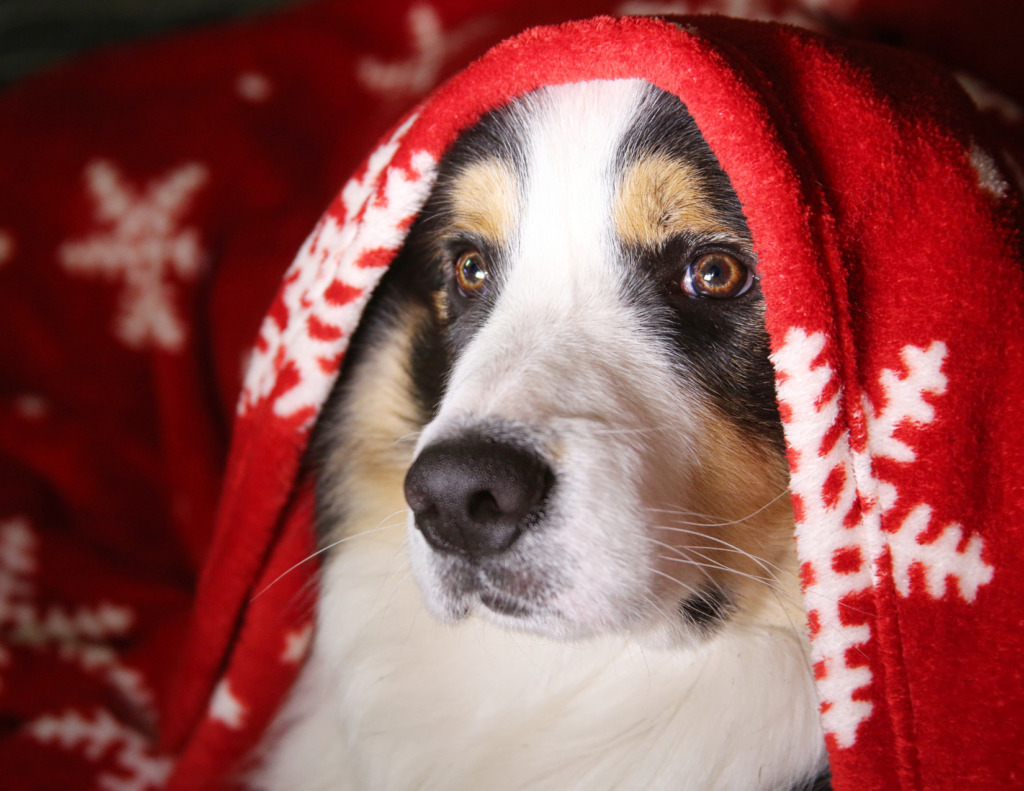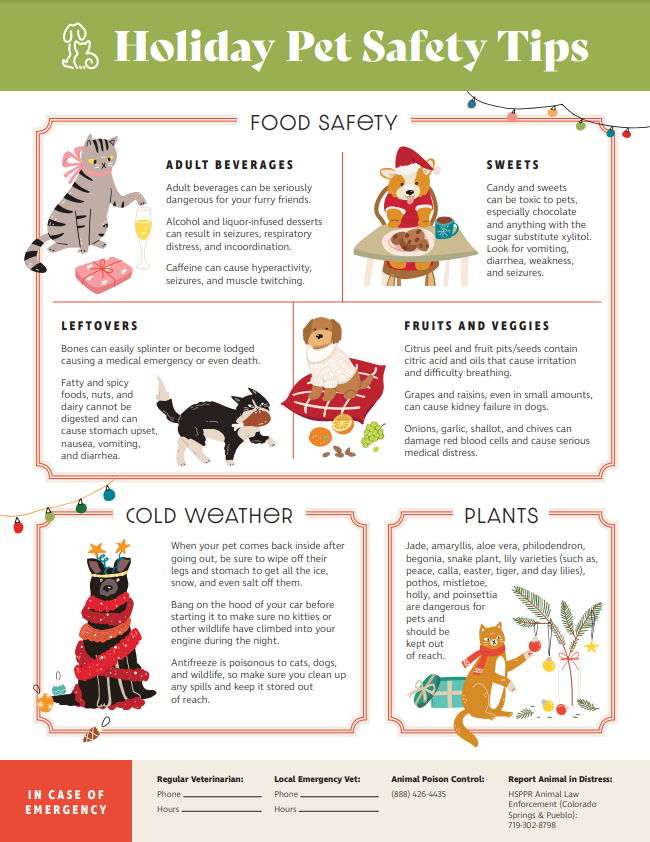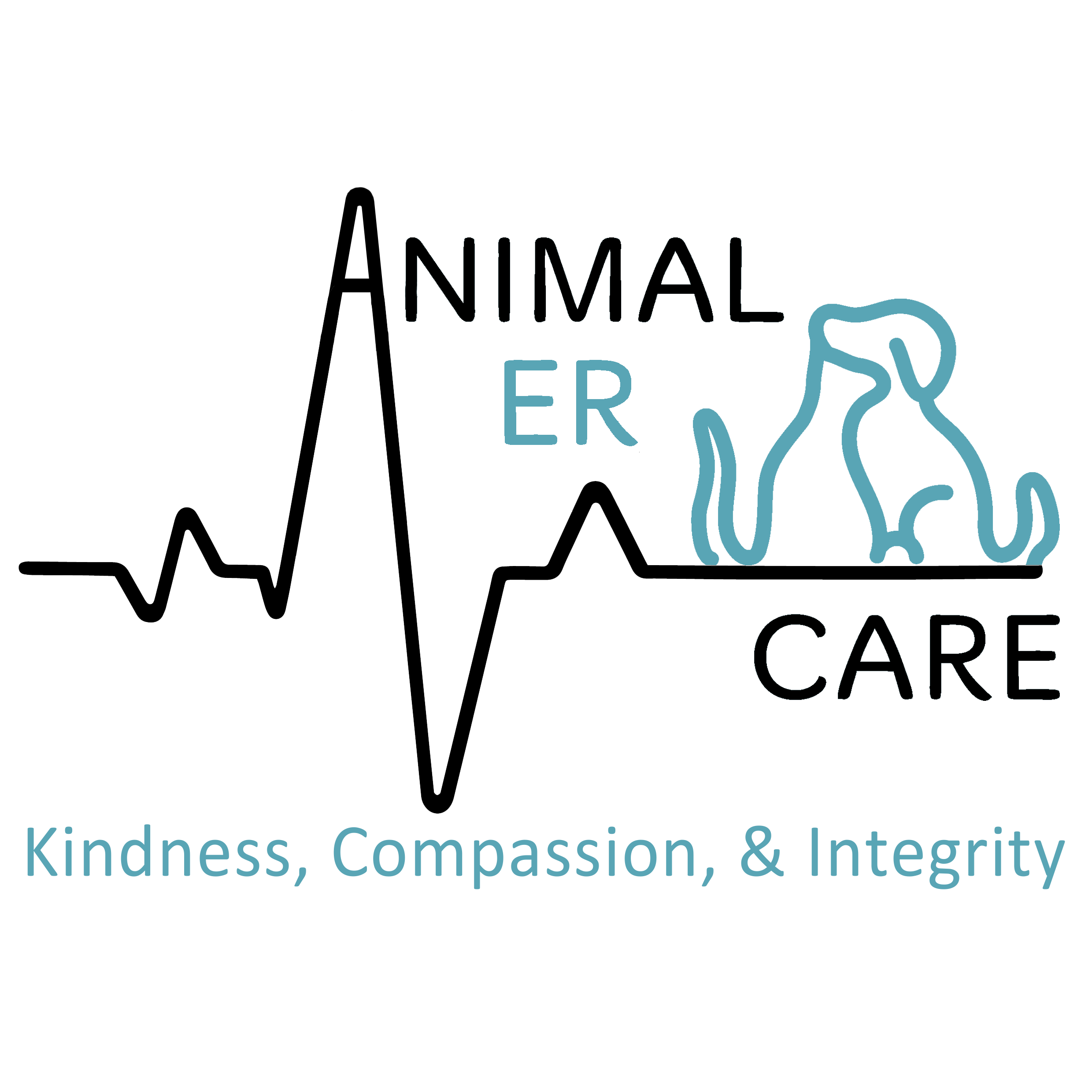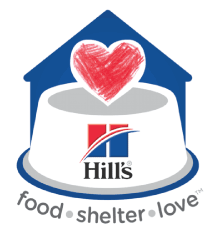
It’s the most wonderful time of the year … But the holidays can bring hazards for your pets! That’s why we’ve put together some tips to help keep your pets safe during all the holiday fun.
Food safety:
Keep your pets away from the table and unattended plates, and ensure your garbage cans are securely covered.
- Leftovers
- Fatty and spicy foods, including nuts, can cause stomach upset, nausea, vomiting, and diarrhea.
- Bones can easily splinter or become lodged and cause a medical emergency or even death.
- Dairy cannot be digested and causes upset stomach and diarrhea.
- Candy and sweets can be toxic to pets, especially chocolate and anything with the sugar substitute xylitol. Look for vomiting, diarrhea, weakness, and seizures.
- Adult beverages can be seriously dangerous for your furry friends.
- Alcohol and liquor-infused desserts can result in seizures, respiratory distress, and incoordination.
- Caffeine can cause hyperactivity, seizures, and muscle twitching.
- Fruits and veggies
- Citrus peel and fruit pits/seeds contain citric acid and oils that cause irritation and difficulty breathing.
- Grapes and raisins, even in small amounts, can cause kidney failure in dogs.
- Onions, garlic, shallot, and chives can damage red blood cells. Symptoms include vomiting, lethargy, trouble breathing, and pale or discolored gums.
Holiday décor and plants:
- Make sure your tree and ornaments are secure and out of reach.
- Broken ornaments, toppled trees, and ingested decorations can lead to a pet ER trip.
- Ingested tree needles can puncture the intestinal lining or cause an obstruction.
- The water in your tree stand may contain fertilizers and bacteria, which cause nausea or diarrhea.
- Mistletoe, holly, poinsettia, and many types of lilies are dangerous for pets.
- Poinsettia can cause irritation.
- Mistletoe and holly cause nausea and vomiting.
- Lilies can cause kidney failure in cats.
- Candles and wires can cause serious injury. Keep them out of reach of tiny paws to avoid burns and shocks.
Travel Safety:
- Always secure your pet in a carrier, crate, or seatbelt harness. Don’t allow them to be free-range or sit up front where airbags can injure them.
- Don’t leave your pet alone in a parked car. Heat stroke and hypothermia occur quicker than you think!
- Pack your pet’s favorite items and bring plenty of water. Try not to feed them while the vehicle is moving to avoid an upset stomach.
- Ensure your pet has a collar with identifying information and their microchip is registered and updated. Keep pets on a leash or in a carrier while outside the vehicle.
Cold weather:
- Keep your pets inside whenever possible. If it’s cold outside to you, it’s cold outside to them.
- If your pet lives outside, we recommend a warm, waterproof shelter that is raised up a few inches off the ground to keep them warm.
- When your pet comes back inside after going out, be sure to wipe off their legs and stomach to get all the ice, snow, and even salt off them.
- When starting your car up in the morning, first bang on the hood to make sure no kitties or other wildlife have climbed into your engine during the night.
- Antifreeze is poisonous to cats, dogs, and wildlife, so make sure you clean up any spills and keep it stored out of reach.
Visitors and loud noises:
- Let guests know ahead of time that you have pets in your home. Give them a quick overview of your pet’s likes and dislikes.
- Ensure guests know what foods your pet is allowed and what they cannot have.
- Provide a safe and quiet space for your pet to retreat if they become overwhelmed by visitors, children, or noises. Include their food and water, favorite toys, bedding, and soothing music.
- Make sure any medication of yours or your guests are securely locked away.
In case of emergency:
- Prepare for emergencies by gathering all the info you would need – such as the closest emergency vet and their hours, plus your regular vet’s contact info and holiday hours. The included graphic for your fridge has space for this info!
- Pets may be outside if proper access to shelter, water, and food exists. However, as temperatures drop, please encourage your friends, family, and neighbors to limit their pet’s exposure to the elements.
- If you have concerns about the conditions in which a pet is being kept, please call Animal Law Enforcement at 719-302-8798 (for both Colorado Springs and Pueblo). We’re here to help!
- We receive a high number of calls when winter weather strikes, so thank you in advance for your patience. Here are a few things to be thinking about that will help us prioritize and handle each call correctly:
- What is the address of the pet?
- How long has the pet been outside?
- Do you see any shelter for the pet?
- How is the pet behaving?
- We receive a high number of calls when winter weather strikes, so thank you in advance for your patience. Here are a few things to be thinking about that will help us prioritize and handle each call correctly:








